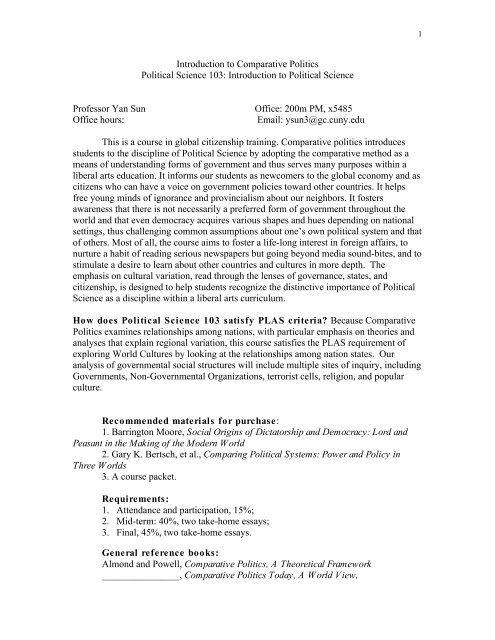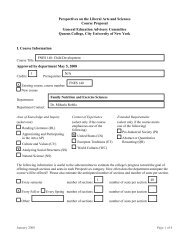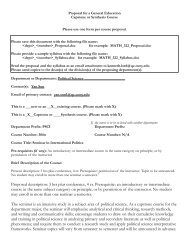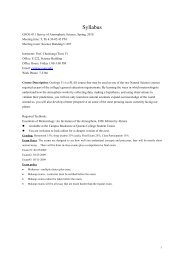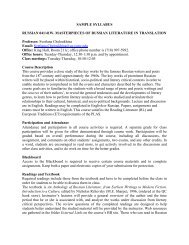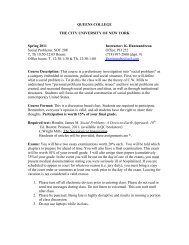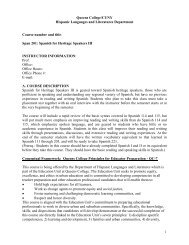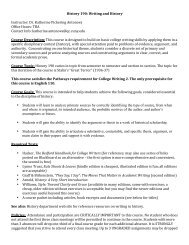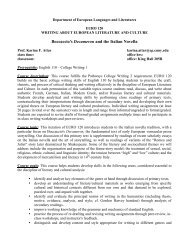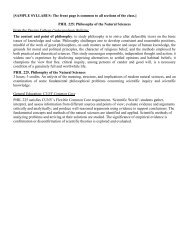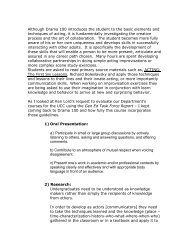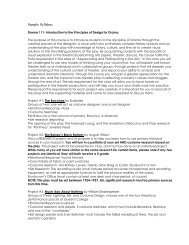Introduction to Comparative Politics Political Science 103 ... - CUNY
Introduction to Comparative Politics Political Science 103 ... - CUNY
Introduction to Comparative Politics Political Science 103 ... - CUNY
You also want an ePaper? Increase the reach of your titles
YUMPU automatically turns print PDFs into web optimized ePapers that Google loves.
<strong>Introduction</strong> <strong>to</strong> <strong>Comparative</strong> <strong>Politics</strong><br />
<strong>Political</strong> <strong>Science</strong> <strong>103</strong>: <strong>Introduction</strong> <strong>to</strong> <strong>Political</strong> <strong>Science</strong><br />
Professor Yan Sun Office: 200m PM, x5485<br />
Office hours: Email: ysun3@gc.cuny.edu<br />
This is a course in global citizenship training. <strong>Comparative</strong> politics introduces<br />
students <strong>to</strong> the discipline of <strong>Political</strong> <strong>Science</strong> by adopting the comparative method as a<br />
means of understanding forms of government and thus serves many purposes within a<br />
liberal arts education. It informs our students as newcomers <strong>to</strong> the global economy and as<br />
citizens who can have a voice on government policies <strong>to</strong>ward other countries. It helps<br />
free young minds of ignorance and provincialism about our neighbors. It fosters<br />
awareness that there is not necessarily a preferred form of government throughout the<br />
world and that even democracy acquires various shapes and hues depending on national<br />
settings, thus challenging common assumptions about one’s own political system and that<br />
of others. Most of all, the course aims <strong>to</strong> foster a life-long interest in foreign affairs, <strong>to</strong><br />
nurture a habit of reading serious newspapers but going beyond media sound-bites, and <strong>to</strong><br />
stimulate a desire <strong>to</strong> learn about other countries and cultures in more depth. The<br />
emphasis on cultural variation, read through the lenses of governance, states, and<br />
citizenship, is designed <strong>to</strong> help students recognize the distinctive importance of <strong>Political</strong><br />
<strong>Science</strong> as a discipline within a liberal arts curriculum.<br />
How does <strong>Political</strong> <strong>Science</strong> <strong>103</strong> satisfy PLAS criteria? Because <strong>Comparative</strong><br />
<strong>Politics</strong> examines relationships among nations, with particular emphasis on theories and<br />
analyses that explain regional variation, this course satisfies the PLAS requirement of<br />
exploring World Cultures by looking at the relationships among nation states. Our<br />
analysis of governmental social structures will include multiple sites of inquiry, including<br />
Governments, Non-Governmental Organizations, terrorist cells, religion, and popular<br />
culture.<br />
Recommended materials for purchase:<br />
1. Barring<strong>to</strong>n Moore, Social Origins of Dicta<strong>to</strong>rship and Democracy: Lord and<br />
Peasant in the Making of the Modern World<br />
2. Gary K. Bertsch, et al., Comparing <strong>Political</strong> Systems: Power and Policy in<br />
Three Worlds<br />
3. A course packet.<br />
Requirements:<br />
1. Attendance and participation, 15%;<br />
2. Mid-term: 40%, two take-home essays;<br />
3. Final, 45%, two take-home essays.<br />
General reference books:<br />
Almond and Powell, <strong>Comparative</strong> <strong>Politics</strong>, A Theoretical Framework<br />
________________, <strong>Comparative</strong> <strong>Politics</strong> Today, A World View,<br />
1
Bernard Brown, ed., <strong>Comparative</strong> <strong>Politics</strong>: Notes and Readings<br />
Dushkin annual editions, <strong>Comparative</strong> <strong>Politics</strong>, latest annual edition<br />
Howard Wiarda, <strong>Introduction</strong> <strong>to</strong> <strong>Comparative</strong> <strong>Politics</strong>: Concepts and Processes<br />
Week 1 Study of <strong>Comparative</strong> <strong>Politics</strong><br />
What is comparative politics and the comparative method of studying politics?<br />
Why should we study it? What questions do we ask and answer that are different from the<br />
non-comparative method? What do we gain from these? How do we organize comparison<br />
of so many different political systems in the world? What are the major analytical<br />
concepts and approaches?<br />
Almond and Powell, <strong>Comparative</strong> <strong>Politics</strong>, A World View, chs. 1-2<br />
Week 2 Development of the First World<br />
Not long ago, countries of the developed world were themselves traditional<br />
societies exhibiting characteristics that we now attribute <strong>to</strong> many developing countries.<br />
How did all this change? How did the industrial revolution lead <strong>to</strong> political change? What<br />
does the lengthy, evolutionary process imply for contemporary societies facing pressures<br />
of economic and political modernization? How does the modernization theory explain<br />
economic and political change from the pre-industrial <strong>to</strong> industrial society?<br />
Moore, Social Origins of Dicta<strong>to</strong>rship and Democracy, ch.1<br />
W. W. Ros<strong>to</strong>w, The Stages of Economic Growth: A Non-Communist Manifes<strong>to</strong>;<br />
summary at http://www.mtholyoke.edu/acad/intrel/ipe/ros<strong>to</strong>w.htm<br />
Max Weber, The Protestant Ethic and the Rise of Capitalism; summary at<br />
http://people.freenet.de/matkuch1/tuteng.htm (longer version at<br />
http://www.eh.net/bookreviews/library/engerman.shtml<br />
*Recommended:<br />
Moore, Social Origins of Dicta<strong>to</strong>rship and Democracy, ch.7<br />
Week 3 The Post-Industrial Society<br />
We have just seen how the early developers evolved from the pre-industrial <strong>to</strong> the<br />
industrial or modern world. In a new development phase in recent decades, how have<br />
they moved from the industrial <strong>to</strong> the post-industrial world? What are the major features<br />
of this new phase? How has the socio-economic transformation entailed by this change<br />
affected post-industrial politics?<br />
Gary K. Bertsch, et al., Comparing <strong>Political</strong> Systems, ch. 1-2 (packet)<br />
Hout et al., “The Persistence of Classes in Post-Industrial Society,” International<br />
Sociology, 3 (1993): 259-78.<br />
Clark et al., “The Declining <strong>Political</strong> Significance of Class,” ibid., 4: 397-410<br />
Week 4 <strong>Political</strong> Culture in the First World<br />
Cultural change and adaptation resulting from evolutionary economic and<br />
political transformation is one core tenet of the modernization theory. How has political<br />
culture evolved from the pre-industrial <strong>to</strong> the industrial and then <strong>to</strong> the post-industrial<br />
age? What are the core values of each stage? What conditions contributed <strong>to</strong> the cultural<br />
changes?<br />
2
Ron Inglehart, “Values, Economic Development and <strong>Political</strong> Change,” in<br />
Bernard Brown, ed., <strong>Comparative</strong> <strong>Politics</strong>: Notes and Readings (2000) (packet)<br />
Bertsch, Comparing <strong>Political</strong> Systems, ch.3<br />
Recommended:<br />
Daniel Bell, “Who will rule … in post-industrial society” and Ron Inglehart,<br />
“Cultural shifts in advanced industrial societies,” summaries at<br />
http://ssr1.uchicago.edu/PRELIMS/<strong>Political</strong>/pomisc1.html<br />
Russell Dal<strong>to</strong>n et al., “Advanced democracies and the new politics,” Journal of<br />
Democracy, 1/2004, pp. 73-80 (e-periodical)<br />
Neil Nevitte, “Value Change and Reorientations in Citizen-State Relations,” at<br />
http://qed.econ.queensu.ca/pub/cpp/SE_english/Nevitte.pdf<br />
Inglehart and Carballo, “Does Latin America Exit? (And is there a Confucian<br />
Culture?) A Global Analysis of Cross-Cultural Differences,” PS, XXX 1997: 34-46 (online)<br />
Ronald Inglehart, Modernization and Post-Modernization: Cultural, Economic<br />
and <strong>Political</strong> Change in 43 Societies (Prince<strong>to</strong>n, 1997)<br />
Jonah Levy, Tocqueville’s Revenge (Harvard, 1999)<br />
Week 5 <strong>Political</strong> Parties in the First World<br />
How does the political party system differ in parliamentary vs. presidential<br />
systems? What are the determinants and consequences of a multiparty vs. two-party<br />
systems? What are the consequences of the PR (proportional representation) vs. the fistpast-the<br />
post (winner-takes-all) elec<strong>to</strong>ral systems on the formation of party systems? Why<br />
should or should not the U.S. adopt the multi-parliamentary system?<br />
Bertsch, Comparing <strong>Political</strong> Systems, ch. 4<br />
Chris<strong>to</strong>pher S. Allen, “The Case for a Multi-Party U.S. Parliament?” Annual<br />
editions, <strong>Comparative</strong> <strong>Politics</strong> 04/05<br />
Robert Moser, “The Impact of Parliamentary Elec<strong>to</strong>ral Systems in Russia,” in<br />
Archie Brown ed., Contemporary Russian <strong>Politics</strong>, 195-207<br />
Recommended:<br />
Mattei Dogan, “Erosion of the Class and Religious Vote,” in Brown, ed.,<br />
<strong>Comparative</strong> <strong>Politics</strong>: Notes and Readings (2000), 304-313<br />
Piero Ignazi, “The Rise of New <strong>Political</strong> Parties,” in ibid., 314-322<br />
Betz, “The New <strong>Politics</strong> of Resentment: Radical Right-wing Populist Parties in<br />
Western Europe,” <strong>Comparative</strong> <strong>Politics</strong>, 25 (4), 1993; pp.413-24<br />
Rohrschneider, “New Party versus Old Left Realignments,” Journal of <strong>Politics</strong> 55<br />
(3) 1993: 682-701<br />
Roger Karapin, “Radical-Right and Neo-Fascist <strong>Political</strong> Parties in Western<br />
Europe,” <strong>Comparative</strong> <strong>Politics</strong>, Jan. 1998, pp. 213-31<br />
Sheri Berman, “The Life of the Party,” in above, Oct. 1997<br />
Week 6 <strong>Political</strong> Institutions of the First World<br />
What are the pros and cons of a parliamentary system vs. a presidential system?<br />
How does it work differently? Is grass greener on the other side? Which of the two<br />
should a new democracy adopt? Why?<br />
Bertsch, Comparing <strong>Political</strong> Systems, ch.5<br />
Eugene Huskey, “Democracy and Institutional Design in Russia,” in Archie<br />
Brown ed., Contemporary Russian <strong>Politics</strong>: A Reader, 29-45<br />
3
J Brown, “There is no crash course in democracy,” New Y ork Times, 12/14/2003<br />
Recommended:<br />
Arent Lijphart, Parliamentary versus Presidential Government, ch.1<br />
“Presidential vs. Parliamentary Democracy: A Debate” --<br />
Linz, “The Perils of Presidentialism,” Bernard Brown, <strong>Comparative</strong> <strong>Politics</strong>:<br />
Notes and Readings, 342-51<br />
Horowitz, “Comparing Democratic Institutions,” ibid., 352-54<br />
Linz, “A Final Judgment,” ibid., 355<br />
Kent Ea<strong>to</strong>n, “Parliamentarism versus Presidentialism in the Policy Arena,”<br />
<strong>Comparative</strong> <strong>Politics</strong>, April 2000, 355-373.<br />
Lijphart and Waisman, Institutional Design in New Democracies (1996)<br />
Shain, Yossi and Juan Linz, Between States: Interim Governments and<br />
Democratic Traditions, (Cambridge, 1995)<br />
Week 7 <strong>Political</strong> Development of Late Comers: the Fascist Route<br />
How do conditions for modernization differ for late developers? What special<br />
constraints do they face? What are the economic and political consequences? As a late<br />
developer Germany and Japan faced special pressures and constraints, which led the state<br />
<strong>to</strong> play a heavy role in modernization. Such a pattern of modernization did not lead <strong>to</strong><br />
democracy but the rise of fascism. Why and how?<br />
Moore, Origins of Democracy and Dicta<strong>to</strong>rship, ch.5<br />
Recommended:<br />
Moore, above, ch.8<br />
Week 8 Development of Late Comers: Dependency and Communism<br />
Other late developers did not take the fascist route <strong>to</strong> the modern world, but a path<br />
of dependent development or communist revolution. Why? External (colonialism) or<br />
internal reasons? What would the dependency vs. modernization theories say?<br />
Frances Moulder, Japan, China and the Modern World Economy, chs. 4, 7<br />
Recommended:<br />
Frances Moulder, Japan, China and the Modern World Economy, Intro.<br />
Lawrence Harrison, Culture Matters and Who Prospers<br />
Aujiac, “Cultures and Growth,” from Seligson, The Gap between Rich and Poor<br />
Week 9 Models of Industrialization: U.S. versus Japan<br />
Which model offers a better model of industrialization for late developing<br />
countries – the Anglo-American vs. the Germanic-Japanese one? What is the relevance of<br />
the Japanese model for the Newly Industrialized Economies? What is the relevance of<br />
NIEs for other late developers? Are there only singular path or plural models for late<br />
development?<br />
James Fallow, Looking at the Sun, pp. 179-190, 207-231<br />
Fernado Fajnzylber, “The United States and Japan as Models of<br />
Industrialization,” in Gerffi and Wyman eds., Manufacturing Miracles<br />
Recommended:<br />
World Bank, The East Asian Miracle, <strong>Introduction</strong><br />
Frederick Deyo, The <strong>Political</strong> Economy of the New Asian Industrialism<br />
4
Moore, Social Origins, chapter on America<br />
Week 10 Development of the Late Comer: The Communist Route<br />
Another group of late developers <strong>to</strong>ok the Communist route <strong>to</strong> the modern world,<br />
under which the state played a heavy role in modernization and the organization of<br />
politics and society. Why and how? Post-Communist Reforms: why and how?<br />
Bertsch, Comparing <strong>Political</strong> Systems, ch. 8<br />
Ivan Volgyes, “The Economic Legacies of Communism,” and Jane Curry, “The<br />
Sociological Legacies of Communism,” in Barany and Volgyes eds., The Legacies of<br />
Communism in Eastern Europe<br />
Recommended:<br />
Summary of Marx, Communist Manifes<strong>to</strong> (handouts)<br />
Blasi, Kroumova and Kruse, Kremlin Capitalism (Cornell, 1997)<br />
Brown, Grooves of Change: East Europe at the Turn of the Millennium (Duke)<br />
Week 11 <strong>Political</strong> Development of the Third World<br />
Modern India represents a special case of late development: emergence of<br />
democracy but not capitalist development. What conditions led <strong>to</strong> this paradox? What<br />
had been the impact of pre-colonial and colonial rule on India’s development? What is<br />
the “price of peaceful change” as represented in the Indian case? What does this price<br />
entail for the contemporary push for democratization before economic development?<br />
Moore, Social Origins of Dicta<strong>to</strong>rship and Democracy, ch. 6<br />
Recommended:<br />
Moore, above, ch. 9<br />
Handelman, The Challenge of Third World Development (Prentice-Hall 2002)<br />
Chris<strong>to</strong>pher Clapham, Third World <strong>Politics</strong>: An <strong>Introduction</strong> (Wisconsin, 1985)<br />
Thomas, Third World Atlas (Open University, 1994)<br />
Week 12 Impact of Colonialism on the Third World<br />
What were the characteristics of colonial rule? How did colonialism affect or<br />
retard development in developing countries? How does the colonial legacy still impact<br />
politics in these countries? What explains the difficulty of development in many<br />
developing countries?<br />
Bertsch, Comparing <strong>Political</strong> Systems, chs. 15, 16<br />
Recommended:<br />
Movie: A Passage <strong>to</strong> India<br />
Week 13 <strong>Political</strong> Culture in the Third World<br />
What special pressures does political culture face in developing countries that<br />
were not faced by early developers? Especially in the age of developmentism and<br />
globalization? How do we understand the clashes between traditionalism and<br />
modernization, religion and secular culture, western and non-western civilizations, racial<br />
and ethnic groups, native and immigrant groups, local and global cultures; tribal and<br />
corrupt politics; man and nature?<br />
Bertsch, Comparing <strong>Political</strong> Systems, ch. 17<br />
5
McClellan, “The Achievement Motive in Economic Growth,” Smith, “Becoming<br />
Modern,” and Kahn,“The Confucian Ethic and Economic Growth,” From Seligson, ed.,<br />
The Gap between the Rich and the Poor, 53-80 (packet)<br />
Eickelman, “Bin Laden, the Arab “Street,” and the Middle East’s Democracy<br />
Deficit,” Current His<strong>to</strong>ry, 1/2002, pp. 36-39 (online)<br />
Recommended:<br />
Lawrence Harrison ed., Culture Matters, chs. 3-6<br />
Lawrence Harrison, Underdevelopment is a State of Mind<br />
Frances Fukuyama, Trust<br />
Week 14 <strong>Political</strong> Parties and Institutions in the Third World<br />
What explains executive dominance in the political in many Third World<br />
countries? And the dominance of informal institutions over formal ones? What is<br />
patrimonial politics and why? Why have policy performances been unimpressive in many<br />
developing countries?<br />
Bertsch, Comparing <strong>Political</strong> Systems, chs. 18, 19<br />
Recommended journals:<br />
World <strong>Politics</strong><br />
<strong>Comparative</strong> <strong>Politics</strong><br />
<strong>Comparative</strong> <strong>Political</strong> Studies<br />
World Development<br />
Third World Quarterly<br />
Journal of International Affairs<br />
Foreign Affairs<br />
Foreign Policy<br />
Communist and Post Communist Studies<br />
The Economist<br />
Journal of Democracy<br />
Problems of Post-Communism<br />
Communist and Post-Communist Studies<br />
East European <strong>Politics</strong> and Societies<br />
Post-Soviet Affairs<br />
Asian Survey<br />
6


